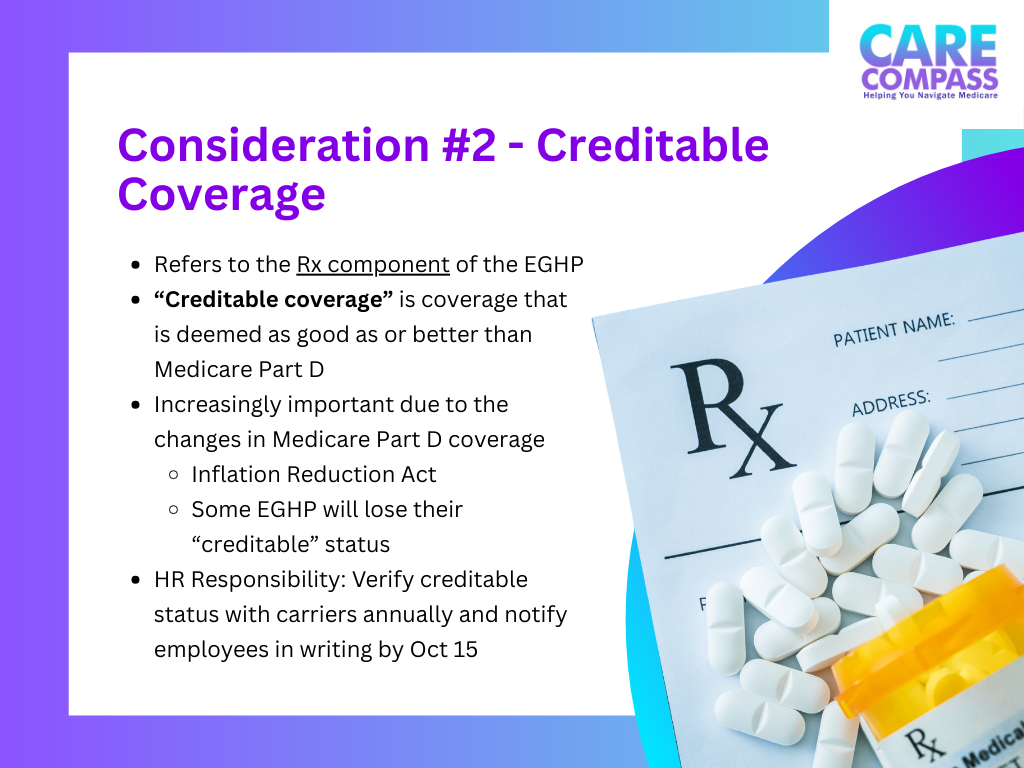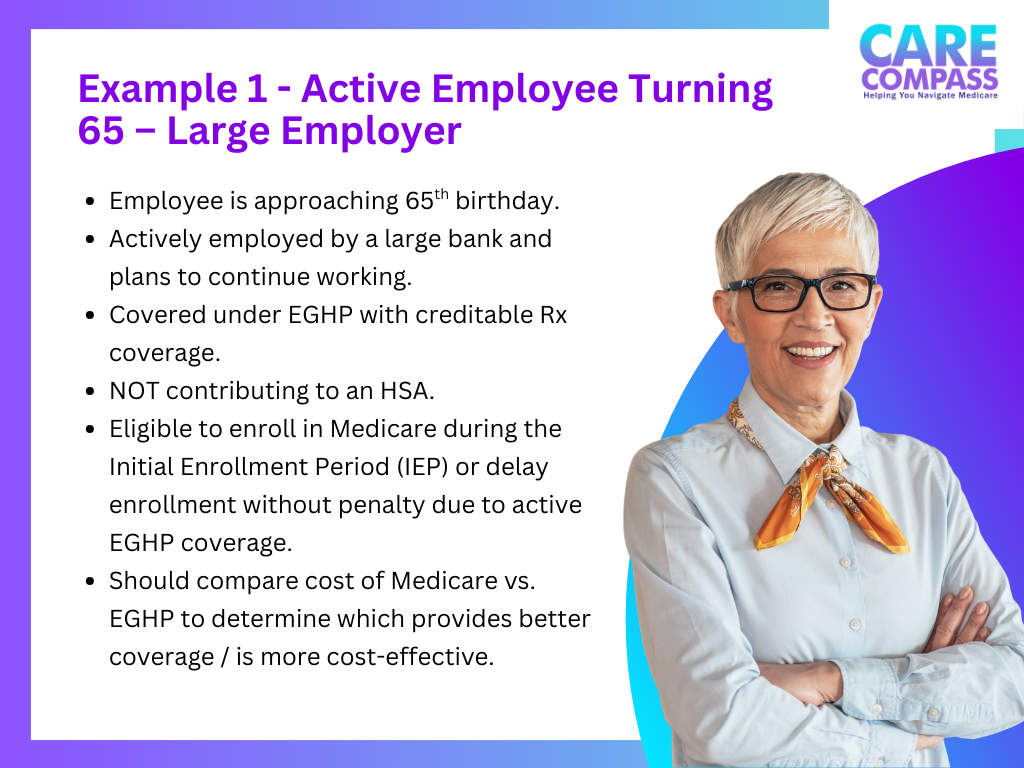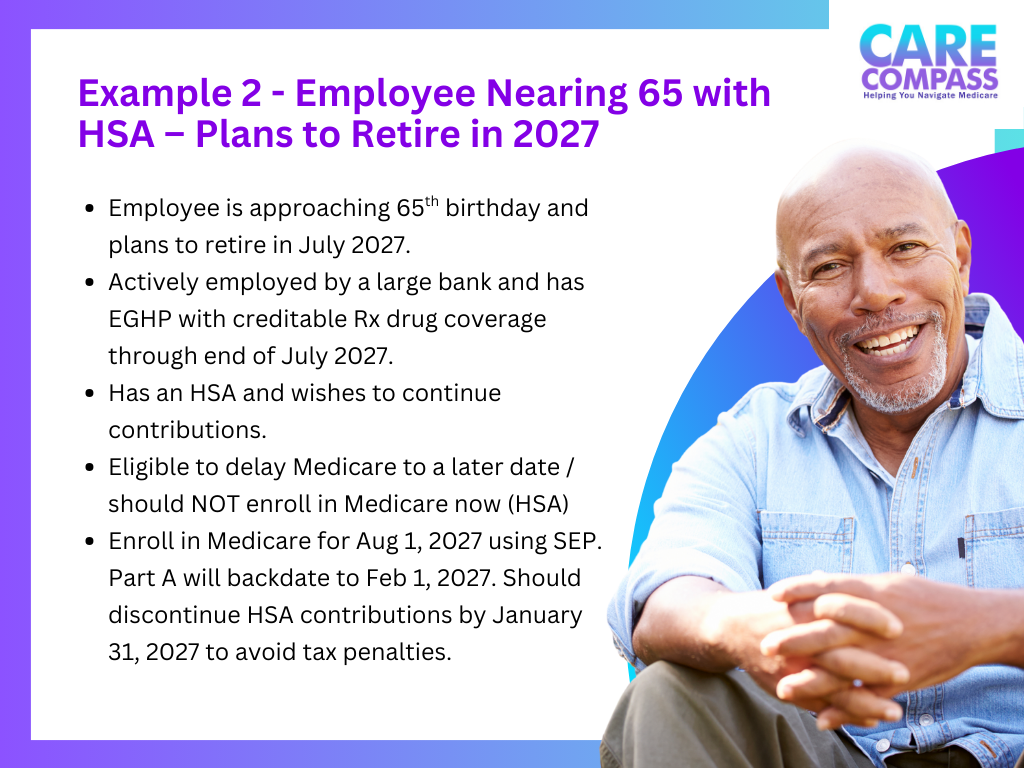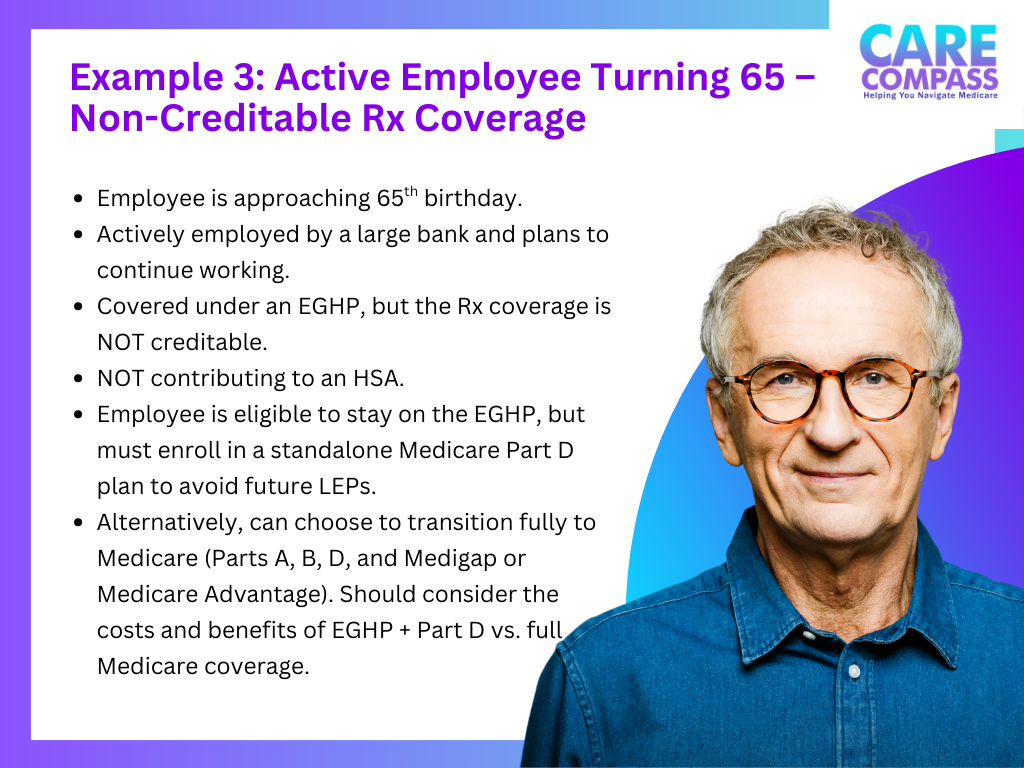Medicare and Group Health Insurance: A Complete Guide for Employees Approaching 65
Feeling overwhelmed about Medicare? You’re not alone. If you're approaching 65 and still working (or covered by a spouse’s employer plan), figuring out when and how to enroll in Medicare can feel like decoding a puzzle. The good news is that it doesn’t have to be stressful! With the right information and guidance, you can make a confident transition when the time is right.
In some situations, delaying Medicare enrollment may be an option, but that decision isn’t one-size-fits-all. Factors like what you're paying for your group plan, how comprehensive that coverage really is, whether a spouse depends on it, prescription drug benefits, and Health Savings Account (HSA) usage can all influence what makes the most sense for you. That’s why it’s important to sit down with a licensed Medicare broker who can help you evaluate your full picture and choose the path that aligns with your health, finances, and future plans.
Medicare Initial Enrollment Period
Let’s start with a review of the Initial Enrollment Period also known as IEP. Your IEP is the 7-month window surrounding your 65th birthday and it is the first opportunity for most people to enroll in Medicare. Your IEP spans seven months in total and includes your 65th birthday month, the three months before your 65th birthday month, and the three months after your 65th birthday month. For example, if you turn 65 on April 15th, your IEP is from January 1st - July 31st. Note: If your birthday falls on the first of the month, your “birthday month” is considered to be the month prior. For example, if you turn 65 on April 1st, March is considered your birthday month and your IEP is December 1st - June 30th.
If you sign up for Medicare during the three months leading up to your 65th birthday, your coverage will begin on the 1st of your birthday month. If you sign up for Medicare during your birthday month or during the three months after, your coverage will begin on the 1st of the following month.
Key Considerations when Delaying Medicare
Although it is true that many people need to enroll in Medicare during their IEP, if an individual has health insurance coverage through a current employer or a spouse’s current employer, they may be able to delay enrolling in Medicare without a Late Enrollment Penalty. The key is understanding how your employer coverage works with Medicare.
There are a number of factors to consider when determining if you should take Medicare during your IEP or if you have the ability to delay Medicare to a later date:
Consideration #1: Employer Size
Fewer than 20 employees: If you are employed by a small employer, which is considered an employer with fewer than 20 employees, you are required to take Medicare Part A and B during your IEP. Why? Because in this situation, Medicare becomes the primary insurance. Your group plan, if you choose to keep it, would become the secondary insurance, and therefore, would pay secondary to Medicare.
Note 📝: If your employer is part of a multi-employer group health plan (like a bank association plan), the 20-employee rule applies to the entire group, not just your individual employer. So even if your workplace has fewer than 20 employees, you may still be able to delay Medicare if at least one employer in the group has 20+ employees. Be sure to confirm this with your HR team or benefits administrator before making a decision.
20+ employees: If you have active employer coverage through your own work or a spouse’s current employment, you have the choice to delay enrollment in Medicare A and B. In this situation, the employee group health plan (EGHP) will be the primary insurance while Medicare, if you choose to enroll, would become the secondary insurance.
But remember: CURRENT employment is key here! You (or your spouse) must be actively employed - retiree coverage and COBRA are NOT considered adequate coverage to delay Medicare!
Consideration #2: Creditable Coverage
Here’s what we know so far:
If you work for a small employer, you must take Medicare Part A and B when you’re first eligible. Medicare is primary and the employee group health plan (EGHP) is secondary (if you choose to keep it).
If you work for a large employer (>20), you have the option to delay Medicare Part A and B to a later date without a Late Enrollment Penalty. In this case, your EGHP remains primary, and Medicare is secondary (if you enroll in it).
Once you’ve confirmed you work for a large employer and are eligible to delay Medicare Part A and B, there’s one more thing to consider:
💊 Is your employer plan’s prescription drug coverage considered “creditable”? 💊
Creditable coverage means your employer’s prescription drug coverage is considered at least as good as Medicare Part D. In other words, it offers equal or better Rx benefits, so you can safely delay enrolling in Medicare drug coverage (Part D) without facing a penalty later.
It should be noted that creditable status is more important than ever! With recent changes to Medicare Part D under the Inflation Reduction Act some employer-sponsored drug plans may no longer meet the creditable coverage standard. This means even employees at large employers may need to consider enrolling in a Medicare Part D plan earlier than expected to avoid late penalties.
You should receive a Creditable Coverage Notice from your employer or plan provider each year by October 15. This document confirms whether your current prescription coverage meets Medicare’s standard and you’ll want to hang onto it! You may need it if you choose to enroll in Medicare Part D at a later date.
What If You Do Have Creditable Coverage?
✅ Great news! If your EGHP’s prescription coverage is creditable, you can safely delay enrolling in Medicare Part D. You can stay on your employer plan and enroll in full Medicare coverage later when you're ready (e.g., at retirement), using a Special Enrollment Period (SEP).
What If You Don’t Have Creditable Coverage?
🚨 Heads up! If your plan’s Rx coverage is not creditable, you have two main options:
Stay on your EGHP and enroll in a standalone Medicare Part D plan
– This protects you from the Late Enrollment Penalty.
Transition fully to Medicare (Parts A, B, D, and either a Medigap plan or Medicare Advantage)
– You may find better or more affordable coverage depending on your health needs.
Medicare Part A and HSAs
Health Savings Accounts (HSAs) are a great tool for tax-free savings, but things get tricky once Medicare enters the picture.
Generally speaking, once you become Medicare-eligible, it is advisable to enroll in Medicare Part A even if you work at a large employer and plan to continue working. Most individuals get Part A premium-free as long as you or a spouse has worked for 40 quarters (10 years). Essentially, you’ve paid for Part A throughout your working life - you’ve earned it! If you continue on your EGHP, Part A acts as a secondary hospital coverage.
Although enrolling in Part A is advised in many situations, it is NOT recommended if you have an HSA and wish to continue contributing to it. Here’s why: by law, you are no longer allowed to contribute to an HSA starting the first month you are enrolled in any part of Medicare. Contributing to your HSA after Medicare enrollment can result in an excise tax penalty of 6% on the excess contributions. And here’s the kicker: Medicare Part A is retroactive for up to 6 months (but not earlier than your 65th birthday). So, if you delay enrollment until, say, August, your Part A coverage will backdate to February, meaning any HSA contributions made between February and July would be considered excess contributions and could be subject to a 6% excise tax.
So, if you plan to delay Medicare and want to keep contributing to your HSA, do not enroll in any part of Medicare when you’re first eligible (including Part A). Stop HSA contributions at least 6 months before you plan to enroll in Medicare.
Caution: Automatic Medicare Enrollment
Employees who start receiving Social Security benefits before age 65 are automatically enrolled in Medicare Part A and Part B when they turn 65. In this situation, you must keep Part A, but if you’re still working and covered by a large employer group health plan (EGHP) with creditable coverage, you may not need Part B yet and paying the premium could be unnecessary. If you fall in this category, you will receive a "Welcome to Medicare" packet a few months before your 65th birthday, which includes your Medicare card and important instructions on how to delay Part B. To avoid automatic enrollment in Part B and the associated premiums ($185/month in 2025), you must follow the steps outlined in the packet in order to delay Part B.
What Should You Do? Let’s Look at 3 Real-World Medicare Examples
Yes, this is a lot of information to digest! To help you understand how all of these pieces fit together, here are three real-life examples of individuals turning 65 while still actively employed. Each one highlights different considerations that can impact your Medicare timeline, costs, and coverage options.
This scenario features someone turning 65 who plans to keep working and is covered by a large employer group health plan (EGHP) with creditable prescription drug coverage:
✅ Large employer, actively working
✅ Creditable drug coverage
➡️ Eligible to delay Medicare A, B and D without penalty
She’s not contributing to an HSA, so enrolling in Part A may make sense since it's premium-free for most individuals. In this case, Part A would act as secondary hospital insurance to the EGHP.
But remember - it's not just about eligibility—comparing costs and coverage between the employer plan and Medicare is key. Medicare may be more affordable while offering better overall coverage.
📌 Tip: Consult with a licensed Medicare broker to review all your options and make an informed choice.
This scenario features someone turning 65 who plans to continue working and retire in 2027. He’s covered by a large employer group health plan (EGHP) with creditable drug coverage, however he is actively contributing to a Health Savings Account (HSA) and wishes to continue his contributions:
✅ Large employer, actively working
✅ Creditable drug coverage
🚫 Actively contributing to an HSA and wishes to continue
➡️ Should delay enrollment in Medicare A, B and D
Since HSA contributions and Medicare enrollment can’t overlap, enrolling in Part A now would prevent him from continuing HSA contributions. This individual should wait to enroll in Medicare until he’s ready to retire.
When the time comes, he’ll enroll in Medicare for August 1, 2027 using a Special Enrollment Period (SEP). This will prevent any gaps in coverage since his group plan will run through the end of July. Part A will retroactively start 6 months prior - February 1, 2027 - so HSA contributions must stop by January 31, 2027.
📌 Tip: A licensed Medicare broker can help coordinate timing and coverage to ensure a smooth transition without penalties or coverage gaps.
This scenario features someone turning 65 who is still working and covered under a large employer group health plan (EGHP), but their prescription drug coverage is not creditable:
✅ Large employer, actively working
🚫 Non-creditable drug coverage
➡️ Must take action to avoid future penalties
Even though he’s eligible to delay Part A and Part B because he is actively working for a large employer, the lack of creditable drug coverage means delaying Medicare Part D would result in a Late Enrollment Penalty later on.
To avoid this, he has two main options:
Stay on the group plan for medical coverage and enroll in a standalone Part D plan for prescription coverage,
Or, transition fully to Medicare, including Parts A, B, D, and possibly a Medigap or Medicare Advantage plan
📌 Tip: This is a great example of why it’s important to confirm whether your drug coverage is creditable each year. A licensed broker can help you explore which path offers the best coverage and cost savings for your unique situation.
Summary
Turning 65 while still working (or covered under a spouse’s employer plan) means you have options, but those options aren’t one-size-fits-all. While many individuals can delay enrolling in Medicare, that doesn’t always mean they should. Factors like employer size, current premiums, prescription drug coverage, HSA contributions, and whether a spouse is on the plan all play a critical role in determining what makes the most financial and medical sense.
The best way to avoid costly penalties or gaps in coverage is to take a proactive approach. Review your group plan benefits, compare them to Medicare, and most importantly, talk with a licensed Medicare broker who can help you weigh your options based on your unique situation. Remember: There is NO COST to work with an independent Medicare broker and there are many benefits of doing so! Don’t wait - Contact Care Compass today to review all of your options!
Care Compass is an independent insurance agency that helps seniors navigate the complexities of Medicare and other Senior Products. Our goal is to empower Medicare-eligible individuals to make educated and informed decisions about their healthcare. Our services are offered at NO COST to you. Care Compass is proudly owned and operated in Duncansville, Pennsylvania and we serve the residents of Blair County and the surrounding region. If you need Medicare assistance near Altoona, PA, contact us today!












